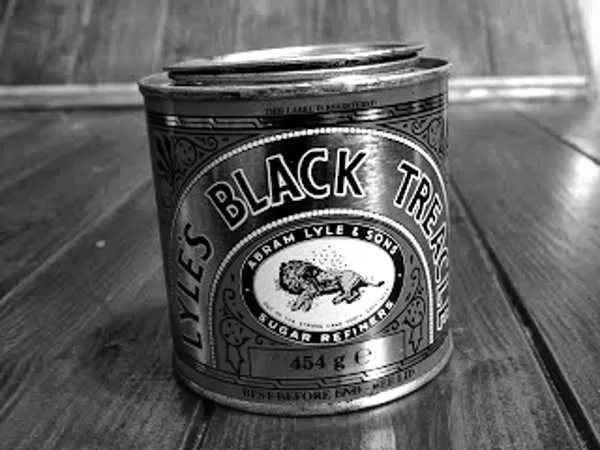Unraveling the Dark Origins of Treacle and Treacle Mines!
If honey has an evil twin, it would undoubtedly be treacle – particularly the dark, sticky variety known as black treacle. Treacle is an intriguing substance with a deep history and unexpected origins. Its story weaves together ancient antidotes, bizarre medicinal practices, and mythical treacle mines, all culminating in its use today in delicious British treats like Parkin. Let’s explore the rich history of treacle and its evolution from a potent remedy to a beloved ingredient in British baking.
The Mysterious Origins of Treacle
The word “treacle” has roots that stretch back to ancient times, with its earliest usage found in Chaucer’s Canterbury Tales (1387). Here, treacle was not a sugary syrup but rather a medicinal substance. In medieval England, “triacle” or “treacle” referred to an antidote for poison, a meaning derived from the Greek word “θηριακη” (theriake), meaning a remedy against the bite of a wild or venomous beast.
During the Roman Empire, physicians like Andromachus, who served Emperor Nero, concocted a potent mixture known as “Venice Treacle.” This remedy included 64 ingredients, such as opium, red roses, saffron, aniseed, and even live vipers steeped in white wine! Over time, physicians across Europe modified this recipe, creating versions like the “Grand Treacle” and the simpler “German Treacle,” which used fewer ingredients but retained the key elements like myrrh and gentian.
Treacle’s Transformation from Medicine to Sweetness
As centuries passed, the term “treacle” began to refer to any medicinal syrup. Eventually, it extended to all syrups derived from sugar refining. Today, we have both “Golden Syrup” (a lighter, milder version) and “Black Treacle” (a darker, richer version), although these terms can sometimes confuse – particularly since Golden Syrup is often used to make the famous treacle tart, not black treacle!
Interestingly, treacle also became associated with the curious concept of “treacle wells.” These were believed to have healing properties, leading to the playful notion that treacle actually flowed from magical wells or even mythical mines. Generations of British children were told tales of treacle mines, such as the famous Tockholes Treacle Mines in East Lancashire. This folklore gained popularity in the 1990s with the animated series The Treacle People, set at a fictional mine in Sabden, Pendle Hill, which was already a tourist attraction drawing thousands of visitors annually before its closure in 1998.
Treacle in British Cuisine: The Iconic Parkin
Today, treacle’s role in the kitchen is far more delightful. A vital ingredient in Parkin, a traditional northern English gingerbread cake, black treacle adds richness, depth, and a characteristic stickiness to this treat. Often enjoyed on Bonfire Night in November, Parkin is best when aged for a few days to allow its flavors to fully develop.
Traditional Parkin Recipe:
Ingredients:
- ½ lb Lard (do not use butter)
- ½ lb Black Treacle
- ½ lb Self-Raising Flour
- 4 oz Fine or Medium Oatmeal
- 4 oz Brown Sugar
- 2 Large Beaten Eggs
- ½ cup Warm Milk
- 4 tsp Ground Ginger
- 2 tsp Nutmeg
- 1 tsp Mixed Spice
- 1 tsp Baking Powder
- Fresh Ginger (grated, to taste)
Instructions:
- Melt the lard and mix with black treacle.
- Combine with flour, oatmeal, brown sugar, beaten eggs, warm milk, and spices.
- Add grated ginger for extra zest.
- Grease a loaf tin and pour in the mixture.
- Bake for 1.5 hours at 140°C until browned.
- Let cool, then store in a tin for three to four days to allow the flavor to mature.
Enjoy Parkin as a cake with a hot drink, or serve it as a pudding with custard. It can be kept for at least two weeks, but it rarely lasts that long!
While treacle may no longer be used as a cure for snake bites or poison, its legacy endures in British cuisine and culture. From medicinal remedies and mythical mines to delicious treats like Parkin, treacle has traveled a long, sweet road. Its dark, sticky richness remains a beloved ingredient, especially during festive celebrations like Bonfire Night.

